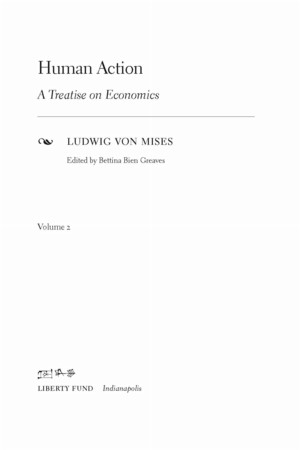
Part of: Human Action: A Treatise on Economics, in 4 vols. (LF ed.) Human Action: A Treatise on Economics, vol. 2 (LF ed.)
- Ludwig von Mises (author)
- Bettina Bien Greaves (editor)
In the foreword to Human Action: A Treatise on Economics, Mises explains complex market phenomena as “the outcomes of countless conscious, purposive actions, choices, and preferences of individuals, each of whom was trying as best as he or she could under the circumstances to attain various wants and ends and to avoid undesired consequences.”
Show more
It is individual choices in response to personal subjective value judgments that ultimately determine market phenomena—supply and demand, prices, the pattern of production, and even profits and losses. Although governments may presume to set “prices,” it is individuals who, by their actions and choices through competitive bidding for money, products, and services, actually determine “prices”. Thus, Mises presents economics—not as a study of material goods, services, and products—but as a study of human actions. He sees the science of human action, praxeology, as a science of reason and logic, which recognizes a regularity in the sequence and interrelationships among market phenomena. Mises defends the methodology of praxeology against the criticisms of Marxists, socialists, positivists, and mathematical statisticians. Mises attributes the tremendous technological progress and the consequent increase in wealth and general welfare in the last two centuries to the introduction of liberal government policies based on free-market economic teachings, creating an economic and political environment which permits individuals to pursue their respective goals in freedom and peace. Mises also explains the futility and counter-productiveness of government attempts to regulate, control, and equalize all people’s circumstances: “Men are born unequal and … it is precisely their inequality that generates social cooperation and civilization.”
Key Quotes
Socialism & Interventionism
Money & Banking
By committing itself to an inflationary or deflationary policy a government does not promote the…
Money & Banking
Economics
Colonies, Slavery & Abolition